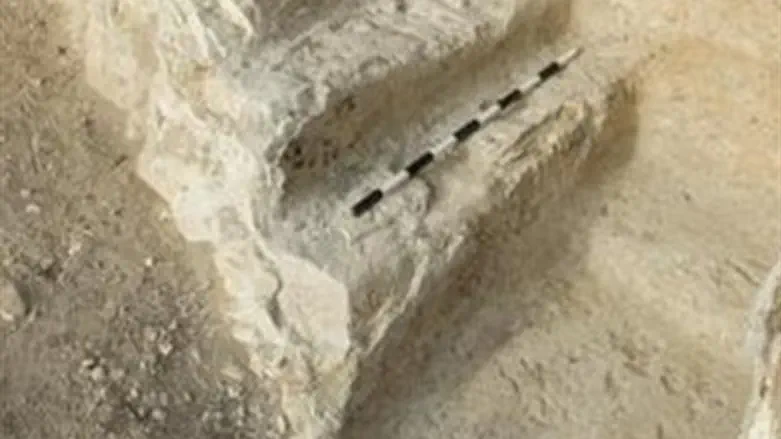
Israel Antiquities Authority excavations in the Valley of Elah's Tzomet Haelah, funded by the Netivei Israel state transportation company, made a rare discovery recently in unearthing a mikveh (ritual Jewish bath) from the Second Temple period.
In an interesting intertwining of time periods, on the roof of an adjacent massive water cistern inscriptions were found, made in the rock by Australian soldiers who were on the site during World War II.
The 1,900-year-old mikveh and 1,700-year-old water cistern were unearthed in explorations ahead of the construction of Highway 38.
"We found a mikveh with five steps quarried into the rock, with the fifth step serving as a bench to sit on the lip of the ritual immersion pool," said Yoav Tsur, the Authority's director of excavations.
Elaborating on the find, Tsur noted "at the site we found intricate pottery shards from the second century CE, including candles, red burnished vessels, a jug and cooking pots. It appears that during the second century CE the mikveh fell out of use, possibly in light of the events of the Bar Kokhba Revolt (132-135 CE)."
"South of the mikveh, an entrance carved in the rock was found that apparently served as an entrance to an expansive water reserve," continued Tsur.
"It seems that in an early period, the reserve was smaller, and served as an otzar (water collecting vat) for the mikveh. When the mikveh stopped serving its original function, the reserve cavity was widened to its larger dimensions, and next to it was built a wide space to make water drawing easier," noted the archaeologist.
During the excavation, researchers were surprised to discover more modern finds - namely the Australian soldiers' inscriptions on the reserve's ceiling, showing that the site was known of in the 1940s.

The inscriptions were deciphered by Assaf Peretz, an archaeologist and historian of the Authority.
"Among other things, two names were identified inscribed into the rock in English: Cpl Scarlett and Walsh," said Peretz. "Adjacent to the names, the abbreviation RAE was carved with two numbers, NX9168 and NX7792. Under the writing appears the date 30/05/1940."
Explaining the inscriptions, Peretz noted they realized they were made by soldiers since Cpl stands for Corporal, with the numbers being their military identity numbers, and RAE standing for Royal Australian Engineers.
By searching the Australian government archives, the Authority located Corporal Philip William Scarlett, born in Melbourne in 1918 who served in the war and died in 1970, and Patrick Raphael Walsh, who was born in Cowra in 1910 and died in 2005.
Apparently the two were part of the Australian Sixth Division stationed in Israel during the British Mandate to undergo training before joining the combat in France, although France's early surrender had them sent to Egypt in October 1940.
"If the relatives of these people are acquainted with the story, we’ll be happy if they contact us and we’ll share with them the warm greetings left behind by Scarlett and Walsh," the Israel Antiquities Authority released in a statement.
In another discover on the site, Peretz noted "the fins of British mortar bombs were found while searching the site, as were twenty-seven rifle cartridges, six of which were manufactured in Australia and fired in the region."
Tsur summarized the finds, saying they "allow us to reconstruct a double story: about the Jewish settlement in the second century CE, probably against the background of the events of the Bar Kokhba revolt, and another story, no less fascinating, about a group of Australian soldiers who visited the site c. 1,700 years later and left their mark there."
Pablo Betzer, the Authority's district archaeologist for the Judah region, stated that in light of the discoveries, it was requested that Netivei Israel change the route of the highway around the junction to preserve the finds, a proposal that the company agreed to.